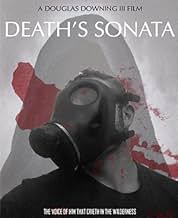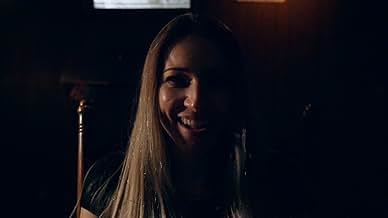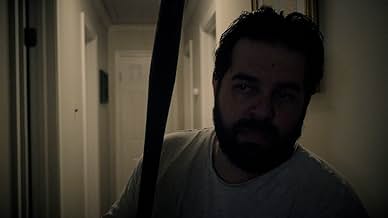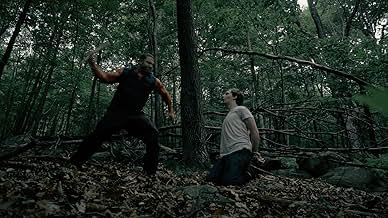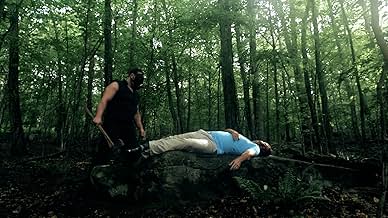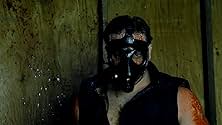अपनी भाषा में प्लॉट जोड़ेंThe story of a man suffering from Schizophrenia and the psychotherapist who tries to find him with the help of his young Bi-Polar patient.The story of a man suffering from Schizophrenia and the psychotherapist who tries to find him with the help of his young Bi-Polar patient.The story of a man suffering from Schizophrenia and the psychotherapist who tries to find him with the help of his young Bi-Polar patient.
Dannah Kelly
- Mandy
- (as Dannah Basgall)
फ़ीचर्ड समीक्षाएं
Blood and story. Brutality and emotions. Was an interesting story and kept me watching. I had to google some of the meanings. Biblical and etc. Especially with the ending verse... I really enjoyed this..was more than a slasher. Was a drama about mental health and abuse. And illness. The story got my attention right away. The graphic violence kept me intrigued. The film had a gritty brutal vibe and interesting plot and twist. The twist wasn't too hard to figure out but I loved that it was what I was hoping. A little violent for my taste but the story kept me intrigued. Overall check it out. A good indie horror that exceeded my expectations.
Death's Sonata is a brutal, unsettling indie horror film that leans heavily into psychological breakdown, religious symbolism, and bursts of shocking violence. It's ambitious and often intense, with some genuinely disturbing sequences-but it's also uneven in spots, and that keeps it from fully hitting the mark.
The story centers on Dr. William Fredrickson, a longtime psychotherapist who starts to suspect that his former patient Charles-diagnosed with schizophrenia-is behind a growing string of violent murders. Charles, now living off-grid in a remote hunting cabin, believes the Grim Reaper is speaking to him directly and ordering him to carry out killings. As the bodies pile up, Fredrickson recruits another patient, Matthew, to help track Charles down before the police get to him.
This isn't a slow, moody horror film. It's aggressive and often relentless. The gore is front and center when it hits, and it's not for the faint of heart-some of the kills are nasty, graphic, and deeply uncomfortable. But they're also grounded in the story, not thrown in for shock value. You really feel like you're watching someone unravel-and drag others down with him.
The performances are solid. Charles is played with a disturbing kind of fragility-he's both victim and threat, which keeps the audience unsettled. Fredrickson brings weight to the role of a man carrying guilt and doubt. Matthew adds unpredictability, though some of his arc feels rushed.
The film's biggest strengths are its commitment to tone and its willingness to go dark-really dark. The violence has consequences, the fear is rooted in psychological collapse, and the religious undertones give it an extra layer of unease. But it's not flawless. Some scenes feel choppy, the dialogue can be stiff, and there are moments where the narrative momentum slips.
The story centers on Dr. William Fredrickson, a longtime psychotherapist who starts to suspect that his former patient Charles-diagnosed with schizophrenia-is behind a growing string of violent murders. Charles, now living off-grid in a remote hunting cabin, believes the Grim Reaper is speaking to him directly and ordering him to carry out killings. As the bodies pile up, Fredrickson recruits another patient, Matthew, to help track Charles down before the police get to him.
This isn't a slow, moody horror film. It's aggressive and often relentless. The gore is front and center when it hits, and it's not for the faint of heart-some of the kills are nasty, graphic, and deeply uncomfortable. But they're also grounded in the story, not thrown in for shock value. You really feel like you're watching someone unravel-and drag others down with him.
The performances are solid. Charles is played with a disturbing kind of fragility-he's both victim and threat, which keeps the audience unsettled. Fredrickson brings weight to the role of a man carrying guilt and doubt. Matthew adds unpredictability, though some of his arc feels rushed.
The film's biggest strengths are its commitment to tone and its willingness to go dark-really dark. The violence has consequences, the fear is rooted in psychological collapse, and the religious undertones give it an extra layer of unease. But it's not flawless. Some scenes feel choppy, the dialogue can be stiff, and there are moments where the narrative momentum slips.
Death's Sonata is a good indie horror film-not perfect, but definitely one of the more engaging low-budget Horrors I've seen in a while. It has a few standout kills and some solid atmosphere, but what really surprised me was the acting. For an indie, the performances are strong across the board, with a cast that clearly commits to the material.
The biggest standout is Dr. Fredrickson. He's chilling-more evil, in many ways, than the masked killer stalking the characters. There's a coldness to him that really creeps under your skin. He's not your typical horror villain. Instead of brute force, his evil comes from a calm, manipulative intellect, which makes him all the more unsettling.
What really held my attention was the story. Indie horror films often fall into the trap of being all style and no substance, but this one kept me intrigued from start to finish. The plot centers around a therapist who's hunting for the one patient he failed, and in doing so, he's sending his current, weaker patients to their deaths-almost like they're bait or tools to reach a final objective. It's a disturbing concept, and it adds a layer of psychological horror that goes beyond just blood and gore.
There are still a few rough edges-some scenes could've used tighter editing or a bit more budget to fully land-but overall, Death's Sonata punches above its weight. If you're into horror that blends slasher violence with psychological depth, it's definitely worth checking out.
The biggest standout is Dr. Fredrickson. He's chilling-more evil, in many ways, than the masked killer stalking the characters. There's a coldness to him that really creeps under your skin. He's not your typical horror villain. Instead of brute force, his evil comes from a calm, manipulative intellect, which makes him all the more unsettling.
What really held my attention was the story. Indie horror films often fall into the trap of being all style and no substance, but this one kept me intrigued from start to finish. The plot centers around a therapist who's hunting for the one patient he failed, and in doing so, he's sending his current, weaker patients to their deaths-almost like they're bait or tools to reach a final objective. It's a disturbing concept, and it adds a layer of psychological horror that goes beyond just blood and gore.
There are still a few rough edges-some scenes could've used tighter editing or a bit more budget to fully land-but overall, Death's Sonata punches above its weight. If you're into horror that blends slasher violence with psychological depth, it's definitely worth checking out.
Heard about this movie from Dread Central, who recommended it a few weeks back. I finally got around to watch and wasn't expecting much since it seems to be a low budget horror. I usually avoid them but since I've seen it recommended by multiple horror communities I gave it a shot.
I was pleasantly surprised. Mostly by the story that's about an obsessed nut job Psychotherapist using his week depressed young patient to find the one patient he couldn't cure. Who happens to be Crazy himself a Schizophrenic... People in town start dying mostly ex patients of the Psychotherapist. Then a detective gets involved and so on... But in the end its a low budget Indie Horror with some good violence and story.
I was pleasantly surprised. Mostly by the story that's about an obsessed nut job Psychotherapist using his week depressed young patient to find the one patient he couldn't cure. Who happens to be Crazy himself a Schizophrenic... People in town start dying mostly ex patients of the Psychotherapist. Then a detective gets involved and so on... But in the end its a low budget Indie Horror with some good violence and story.
Every now and then, a horror film slips through the cracks of the studio machine, drenched in grit, passion, and raw psychological terror. Death's Sonata is one of those rare indie slasher gems that deserves to be whispered about at midnight horror marathons and scribbled onto bathroom stalls in red ink.
Directed with a veteran's eye by Douglas Downing III, this is not your typical body count flick. Sure, there are kills - brutal, deliberate ones - but this isn't about gore for gore's sake. This is about decay. Of the mind, of morality, of a man's grip on reality. And it's horrifying.
Dr. William Fredrickson (played with haunting restraint by Morrison James) isn't your Final Guy or your masked avenger. He's a seasoned shrink clinging to reason as his greatest failure - Charles - slips deeper into madness. Charles is no ordinary killer. He's a schizophrenic outcast who's literally being compelled by Death, the Grim Reaper himself. Whether that's metaphor or manifestation is up for debate, and the film never spoon-feeds you an answer. That's what makes it brilliant.
What Death's Sonata does so well is blend psychological horror with slasher mechanics. It creeps rather than sprints. The woods feel claustrophobic, the hunting cabin like a tomb waiting to be filled. There's a mythic, almost religious undertone - Death isn't just a figure in black; he's a judge, jury, and executioner, and Charles is his trembling scribe.
But don't worry, gorehounds - you'll get your fix. The kills, when they come, are vicious, intimate, and full of dread. No over-the-top chainsaws or cheesy one-liners. This is murder with meaning.
And then there's Matthew - the wildcard. A manic-depressive patient sent to hunt another. His descent into the woods feels like Apocalypse Now through a Friday the 13th lens. By the time the police get involved, it's less about law and more about damage control. There's no justice here - only consequences.
The score is minimalist but bone-chilling. The cinematography has that grimy '70s edge we all crave - think The Prowler meets Session 9. And the pacing, while slow at first, is purposeful. This is a story about erosion - of sanity, of safety, of salvation.
In the end its a chilling, cerebral slasher with a heart full of darkness. If Henry: Portrait of a Serial Killer and The Babadook had a backwoods baby raised on Phantasm and The Seventh Seal, this would be it.
Directed with a veteran's eye by Douglas Downing III, this is not your typical body count flick. Sure, there are kills - brutal, deliberate ones - but this isn't about gore for gore's sake. This is about decay. Of the mind, of morality, of a man's grip on reality. And it's horrifying.
Dr. William Fredrickson (played with haunting restraint by Morrison James) isn't your Final Guy or your masked avenger. He's a seasoned shrink clinging to reason as his greatest failure - Charles - slips deeper into madness. Charles is no ordinary killer. He's a schizophrenic outcast who's literally being compelled by Death, the Grim Reaper himself. Whether that's metaphor or manifestation is up for debate, and the film never spoon-feeds you an answer. That's what makes it brilliant.
What Death's Sonata does so well is blend psychological horror with slasher mechanics. It creeps rather than sprints. The woods feel claustrophobic, the hunting cabin like a tomb waiting to be filled. There's a mythic, almost religious undertone - Death isn't just a figure in black; he's a judge, jury, and executioner, and Charles is his trembling scribe.
But don't worry, gorehounds - you'll get your fix. The kills, when they come, are vicious, intimate, and full of dread. No over-the-top chainsaws or cheesy one-liners. This is murder with meaning.
And then there's Matthew - the wildcard. A manic-depressive patient sent to hunt another. His descent into the woods feels like Apocalypse Now through a Friday the 13th lens. By the time the police get involved, it's less about law and more about damage control. There's no justice here - only consequences.
The score is minimalist but bone-chilling. The cinematography has that grimy '70s edge we all crave - think The Prowler meets Session 9. And the pacing, while slow at first, is purposeful. This is a story about erosion - of sanity, of safety, of salvation.
In the end its a chilling, cerebral slasher with a heart full of darkness. If Henry: Portrait of a Serial Killer and The Babadook had a backwoods baby raised on Phantasm and The Seventh Seal, this would be it.
टॉप पसंद
रेटिंग देने के लिए साइन-इन करें और वैयक्तिकृत सुझावों के लिए वॉचलिस्ट करें
विवरण
- रिलीज़ की तारीख़
- कंट्री ऑफ़ ओरिजिन
- आधिकारिक साइटें
- भाषा
- इस रूप में भी जाना जाता है
- Соната смерти
- फ़िल्माने की जगहें
- उत्पादन कंपनी
- IMDbPro पर और कंपनी क्रेडिट देखें
- चलने की अवधि1 घंटा 43 मिनट
- रंग
इस पेज में योगदान दें
किसी बदलाव का सुझाव दें या अनुपलब्ध कॉन्टेंट जोड़ें


